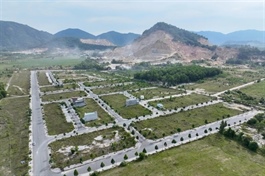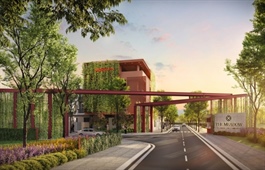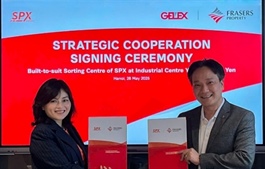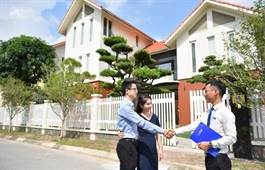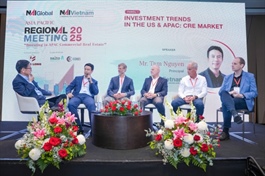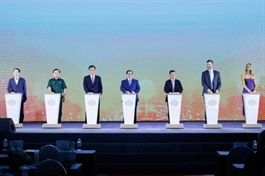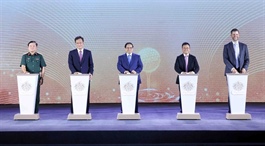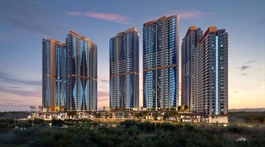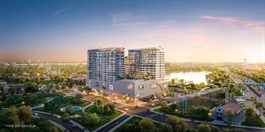Eco-industrial parks help build long-term destination
Eco-industrial parks help build long-term destination
Industrial real estate is becoming part of a broader ecosystem aimed at attracting high-quality investment, where modern standards are increasingly applied to enhance competitiveness and meet global benchmarks.
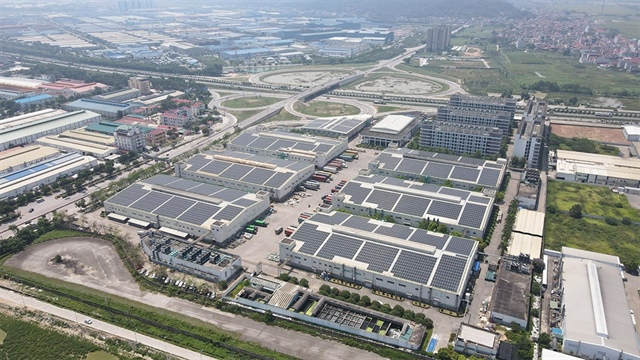
More and more facilities are attempting to meet high energy efficiency and environmental goals, Photo: CMES |
According to Truong Khac Nguyen Minh, deputy general director of industrial property developer Prodezi Long An, as the world grapples with geopolitical uncertainties, trade protectionism, and supply chain restructuring, global enterprises are shifting investment strategies towards open, stable economies with a proactive green transition agenda.
“Most investors we meet remain cautiously optimistic, but they also expect Vietnam to take decisive steps in shaping next-generation foreign investment policies,” Minh said. “New-generation investors, particularly those operating within global supply chains, require a comprehensive ecosystem of technology partners, suppliers, and agile operations.”
With this in mind, Prodezi Long An has pursued a clear, long-term vision focused on sustainable development and added value creation.
The company is developing an eco-centric industrial park model that integrates environmental, social, and governance (ESG) standards and circular economy principles, aiming to create energy-efficient, environmentally friendly, and cost-effective production spaces.
“I believe that if Vietnam take decisive action now to build a deep investment ecosystem, the next foreign investment growth cycle will be not only broader but also more sustainable, effective, and impactful for the national economy,” Minh added.
Similarly, Frasers Property Vietnam is on a journey towards sustainability and green real estate leadership.
According to Edwin Tan, deputy CEO and managing director for industrial and logistics for Southeast Asia, the group’s industrial and logistics footprint in Vietnam has grown to more than 300,000sq.m across four provinces, and is on track to reach nearly one million sq.m by 2028.
“As the real estate sector accounts for nearly 40 per cent of global carbon emissions and more than 70 per cent of urban emissions, sustainability has been a key focus for us since 2006,” Tan said.
Tan added that the group was advancing its ESG agenda through innovation, green building certifications, and climate resilience initiatives. “We were the first Singapore Exchange-listed company to commit to net-zero carbon emissions across scopes 1-3 by 2050,” he said.
In Vietnam, Frasers Property is the first real estate company with science-based targets officially approved. Its roadmap includes installing 215MW of renewable energy capacity by 2030, including 15MW in Vietnam, and 46MW has already been deployed globally.
By 2030, it aims to have all new development projects and 85 per cent of owned or managed properties either green-certified or pursuing certification and also plans to engage 75 per cent of suppliers under its responsible sourcing policy.
To drive Vietnam’s net-zero ambitions, it is introducing industrial service centres, which aim to enrich the industrial ecosystem with amenities and sustainability features such as solar rooftops, electric vehicle charging stations, and smart energy management systems powered by AI.
Pham Thuy Duong, deputy director of Research and Analysis at Dragon Capital, noted that Vietnam has evolved from being a hub for labour-intensive industries like textiles and footwear to attracting major tech giants such as Samsung and Apple, a testament to the country’s rising position in the global supply chain.
“In today’s competitive landscape, tariff barriers and regional rivalry are no longer just about low costs, but about value creation and sustainable commitments. ESG standards have become global investment norms. Even financially strong businesses can be excluded from investment portfolios if they violate such principles,” Duong aid.
Meanwhile, Savills Vietnam highly values the role of AI in ensuring the operational efficiency of industrial real estate.
“AI enhances sustainability while maintaining operational efficiency. In the industrial property sector, AI is used in heating, ventilation, air conditioning, lighting automation, energy management, building security, and resource optimisation,” said Thomas Rooney, associate director of Industrial Property at Savills Hanoi.
“Algorithms can monitor and enhance operations in real-time adjusting lighting, temperature, humidity, and air quality. AI also supports predictive maintenance, minimising waste and reducing costs. Generative design and AI simulation further help developers create energy-efficient, eco-friendly buildings,” added Rooney.
For projects aiming to achieve international green certifications, the compliance process can be complex However, AI can simplify this by continuously monitoring and ensuring adherence to sustainability standards from design through construction and operations, Rooney explained.
As more businesses prioritise sustainability and seek green-certified properties, AI-powered industrial real estate can command higher rents and occupancy rates, while investment in AI-integrated green technology boosts energy efficiency and increases tenant satisfaction.
“In the near future, regulators may mandate the use of AI in building management to meet energy efficiency and sustainability goals.
AI-driven building management may shift from optional to mandatory. Industrial property developers must proactively embrace this trend,” Rooney said.
|
Hardy Diec, COO, KCN Vietnam Despite recent geopolitical fluctuations, Vietnam’s industrial real estate market continues to attract strong interest thanks to the strategic flexibility of developers. The shift towards green industrial parks, integrating technology and upgrading infrastructure, has opened a new growth cycle for the sector. According to experts, current obstacles are merely short-term challenges. With increasingly completed industrial infrastructure and supportive government policies, Vietnam remains a highly attractive long-term investment destination. At the same time, Vietnam’s impressive GDP growth rate serves as a key driver for regional economic development. Industrial real estate continues to draw significant attention from multinational corporations, particularly in technology, electronics, and data centres. Major players like Samsung, Apple, and Nvidia have already established manufacturing facilities in Vietnam and are actively expanding their operations. The market is now entering a new phase of development, focusing on green, sustainable, and smart industrial areas that meet environmental and governance standards, an essential factor in attracting high-quality foreign investment. Vietnam’s industrial real estate sector is expected to maintain its growth momentum, not only due to robust investment inflows but also thanks to internal reforms. Notable among these is the plan to merge provinces, which is expected to reduce planning fragmentation, expand land reserves, and simplify administrative procedures. Moreover, beyond its existing advantages, Vietnam must proactively shift its investment attraction strategy towards high value-added sectors to enhance the overall competitiveness of the economy. As a secondary industrial real estate developer, we remain committed to a strategic, well-planned approach, developing efficient and sustainable infrastructure to support domestic manufacturers and pull in more overseas funding. Pham Thanh Truc, Deputy head, Ho Chi Minh City Industrial and Export Processing Zones Management Authority Before 2030, Ho Chi Minh City will develop an additional 14 new industrial parks (IPs), covering over 3,800 hectares. This expansion will increase the total number of export processing zones and IPs to 36. The investment in these new areas will be implemented in three phases: the first is from now to 2027, with the development of Pham Van Hai I, Pham Van Hai II, Vinh Loc 3, and Nhi Xuan IPs. Phase 2, towards 2030, involves development of An Phu, Trung An, Le Minh Xuan 4, Pham Van Hai III, and Hiep Phuoc Phase III IPs. Phase 3, covering 2030 to 2033, will see development of Tan Phu Trung 2, 3, and 4, as well as Binh Khanh 1 and 2 IPs. In addition to investing in new IPs, Ho Chi Minh City aims to retain all existing industrial land. The city plans to undergo in-depth transformation and restructure industries towards developing high-tech, creative, digital economy, green economy, and circular economy sectors. Currently, we are collaborating with infrastructure development companies to research pilot transformation projects at Tan Thuan Export Processing Zone and Hiep Phuoc, Tan Binh, Cat Lai, and Binh Chieu industrial zones. The goal is to transition these areas into high-tech IPs, eco-IPs, industrial-urban-service complexes, and logistics centres. The investment in these new complexes presents an opportunity for export processing areas and IPs to develop robustly, reaffirming the city’s position as one of the nation’s major industrial centres. |
- 11:56 03/06/2025




